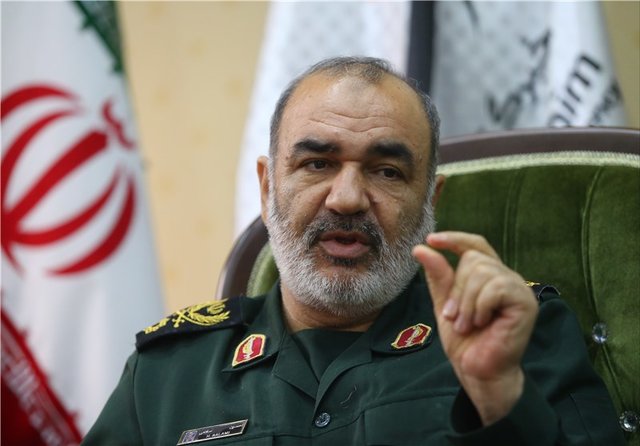TEHRAN, August 13 YJC - Iranian IRGC Deputy Commander said all future operations against ISIS will be named after Shahid Hojaji

TEHRAN, Young Journalists Club (YJC) - Deputy Commander of the Islamic Revolutionary Guard Corps, Brigadier General Hossein Salami, appeared on live television on Saturday night for a briefing on Syria and the Takfiri Terrorists’ numerous defeats and also Iran’s powerful defensive capabilities.
After offering his condolences to the Iranian Nation, he told “Negahe Yek” TV programme of how Shahid Hojaji was captured. "Shahid Hojaji and a few other Shrine Defenders were at a base on the Syria-Iraq border when they were ambushed by a number of vehicle-borne improvised explosive devices (VBIED)" he explained. "The terrorists killed some of the Defenders and took Shahid Hojaji captive."
He also pointed out that killing POWs is not justifiable in Islam or by any kind of logic and that such acts root to Western conspiracies trying to frame Islam as a violent and aggressive religion.
“With the hard endeavours, ISIS is near its end and soon the remaining few will also be wiped out, though they've caused great damage to the true picture of Islam”, said the commander, “When the Zionists ruthlessly killed the youth of Hezbollah we said we’d avenge them and in a couple of days, we did, when ISIS attacked the parliament we hit them hard and today we announce that we will wipe them(ISIS) out and our sword will strike them harder than ever.”
Also he said the operations to take place from now on will be named after Shahid Hojaji.
“We defend all of our soil and our drones provide surveillance over the Persian Gulf and Oman Sea and if the US think we should not, then they should think again.”said the 57 year old Deputy Commander, “If we sense a threat in the Persian Gulf we will shut it down terminating all regional oil exports and conflicts will grow from the Persian Gulf region in result of the political domino effect following the closure of the global choke point.
The Persian Gulf and the Strait of Hormuz are vital both to regional security and the global economy. Tankers carrying about 17 million barrels of oil a day shimmy through the narrows, accounting for about one-third of all oil traded by sea globally. The strait is also a key conduit for shipments of liquefied natural gas, especially from Qatar. For countries that import oil or gas — including the United States, Asian economies, and increasingly, China — keeping Hormuz open to maritime traffic is crucial.
Gen. Salami also said a few words on the Missile Programme: “our Missiles are so great in numbers, and with their rapid production we're having issues with capacity in our arsenal.”
